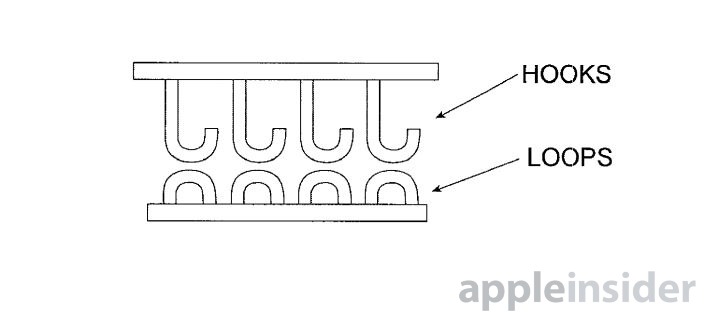Patent on Velcro-like Liquidmetal fastener could be used to prevent Apple device tampering
A U.S. patent application published on Thursday illustrates a Velcro-like fastener concept, but using the amorphous alloy technology Apple picked up through a licensing deal with Liquidmetal.
Although the filing, first discovered by AppleInsider, goes into detail about the manufacturing process, the fastener concept itself is simple, consisting of a series of hooks and/or loops allowing two surfaces to attach either permanently or semi-permanently.
The patent is particularly concerned with using mechanisms to deter tampering with electronics, "by either the normal users of a product, package, or system or others with physical access to it." There's claimed to be a need for a fastener that would either prevent tampering, or render itself and/or the device it was attached to non-functional afterwards.
The patent was originally filed in March 2012, and is credited to people previously linked with Liquidmetal patents such as Christopher Prest and Quoc Tran Pham. The assignee is Crucible Intellectual Property, a Liquidmetal subsidiary.
Apple could conceivably use amorphous alloy fasterners as a way of blocking access to the innards of its devices. Typically, the company denies warranty service to people who try to conduct their own repairs or upgrades. Alternately it could use the technology to combat theft.
The company has had exclusive access to Liquidmetal patents since 2010, but done relatively little with them. At least some iPhone SIM pins have been made using Liquidmetal material, but even products like the Apple Watch use more conventional metals for their cases, despite the Liquidmetal option being up to 1.5 times harder than stainless steel. The expense of mass manufacturing is likely Apple's main obstacle.
 Roger Fingas
Roger Fingas











 Malcolm Owen
Malcolm Owen
 William Gallagher and Mike Wuerthele
William Gallagher and Mike Wuerthele
 Christine McKee
Christine McKee
 William Gallagher
William Gallagher

 Marko Zivkovic
Marko Zivkovic









